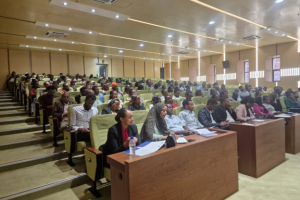
Over the past few years, Ethiopia has embarked on a transformative journey towards digitalization, aiming to modernize various sectors of its economy and infrastructure. This shift towards digital transformation is crucial for the country’s growth and development, as it opens up new opportunities for innovation, efficiency, and competitiveness on the global stage.
Ethiopia, like many developing countries, faces numerous challenges in its quest for economic development. Limited access to technology, inadequate infrastructure, and a predominantly agrarian economy are some of the obstacles that the country needs to overcome. However, digitalization presents a unique opportunity to leapfrog traditional barriers and accelerate progress in key sectors such as healthcare, education, agriculture, and finance.
In response, the country has launched several initiatives and projects to drive the digital transformation of its economy. The government’s “Digital Ethiopia 2025” strategy outlines ambitious goals to expand access to digital technologies, build a skilled workforce, and promote innovation and entrepreneurship. Key projects such as the expansion of broadband infrastructure, the introduction of e-government services, and the establishment of digital payment systems are laying the foundation for a more connected, technology-driven society.
Recently, Deputy Prime Minister Temesgen Tiruneh stated that Ethiopia has reached the critical stage in building an inclusive digital economy and improving government services through the implementation of the Digital Ethiopia 2025 Strategy.
Speaking at the official opening of an exhibition and workshop on Ethiopia’s digital transformation journey at the Science Museum, Temesgen highlighted the country’s ongoing efforts in technological advancements.
Since its launch, the Digital Ethiopia Strategy has laid a strong foundation for economic growth and digital transformation, the Deputy Prime Minister said.
Starting from the 2012 Ethiopian fiscal year, Ethiopia has been implementing the Digital Ethiopia 2025 Strategy to capitalize on opportunities and address the challenges posed by technological growth.
Emphasizing that expanding critical infrastructure is crucial for fostering a digital economy that ensures equitable access for all Ethiopians, the Deputy Prime Minister pointed out the implementation of new legal and operational frameworks that have significantly transformed the digitalization of government services, enabling faster and more efficient services for citizens.
He also acknowledge the private sector’s proactive role in expanding data centers and introducing new digital services and noted the remarkable growth of digital financial services, payments, and electronic commerce during the strategy’s implementation.
Temesgen also underscored the critical foundational activities that have been carried out to build a robust digital economy.
Regarding key digital infrastructures identified in the Digital Ethiopia Strategy, he cited the digital national identity card, implemented since 2014 Ethiopian fiscal year, as one of the most important steps.
To this effect, the Deputy Prime Minister revealed that over 1,000 registration sites have been established across the country in recent years, where more than 11.5 million citizens successfully registered.
The government has also set up a Digital Transformation Council to facilitate the integrated transition of digital transformation, ensuring its security, efficiency, and citizens’ benefits, reducing wastage, and fostering rapid progress.
Temesgen highlighted the development of the Digital Government Strategy and the Electronic Commerce Strategy to further accelerate the digital transformation.
These strategies, which will soon be approved and implemented, are expected to play a pivotal role in improving service delivery, modernizing business practices, and creating a more inclusive digital society.
Recalling the Digital Ethiopia 2025 Strategy is nearing to end, the Deputy Prime Minister noted that preparations are already underway for the development of the Digital Ethiopia 2030 Strategy.
In a related development, the Ministry of Innovation and Technology Ethiopia has stated that Ethiopia made impressive strides in digital transformation.
This was revealed at a three-day Internet Development Conference (IDC) organized recently with the aim to addressing connectivity challenges, enhancing regional cooperation, and fostering the growth of a robust internet economy among countries of the IGAD region.
Opening the conference, Innovation and Technology Minister Belete Molla said the conference is a testament to the tremendous progress made in advancing the digital landscape in Ethiopia and the broader IGAD region.
The internet has become an indispensable tool for economic growth, social development, and communication, he noted, adding that cross border connections empower individuals and drive innovation.
According to the Minister, Ethiopia is experiencing remarkable progress in digital transformation.
“Ethiopia has achieved impressive milestones in expanding telecom infrastructure, though there are still many gaps that need to be addressed. The 4G coverage has expanded to 34.8 percent of the population and the 5G services have been launched in 14 towns,” he said.
The number of mobile subscribers has topped 80.5 million and broadband users have surpassed 45 million.
“The initiative like Telebirr, which now has over 51.54 million users, demonstrate the power of digital innovation to drive financial inclusion and transform how Ethiopians conduct transactions,” he added.
While celebrating achievements, the Minister stated that Ethiopia remains aware of the challenges that lie ahead, stressing the need to continue bridging the digital divide by ensuring that all Ethiopians, regardless of their location or background, can reap the benefits of the digital revolution, prioritizing cyber-security, data privacy, and digital literacy to guarantee that the digital future is secure and equitable.
At present, Belete revealed that the nation is laying the groundwork for an even more ambitious vision, the Digital Ethiopia 2030 Strategy.
The strategy aims at realizing a truly inclusive and prosperous digital future for Ethiopia, capitalizing on the successes of the current initiatives.
The Minister further reaffirmed his country’s commitment to work closely with IGAD countries to address internet challenges and to create a more inclusive and interconnected digital future for the IGAD region and beyond by exploring ways to improve Internet infrastructure, enhance digital literacy, and promote responsible use of the internet.
On his part, Internet Society Ethiopia Chapter President Asrat Mulatu stressed the importance of regional collaboration and collective commitment in enhancing digital infrastructures to address challenges such as unevenly distributed internet access, limited infrastructures and cyber security threats.
In sum, Ethiopia’s journey to digitalization holds great promise for the country’s future. By harnessing the power of technology and innovation, Ethiopia can overcome traditional barriers to development and create a more inclusive and prosperous society. Building a digital economy requires collaboration, investment, and vision, but the rewards are well worth the effort. As Ethiopia continues on its path towards digital transformation, the possibilities are endless, and the potential for positive change is immense.
BY TEWODROS KASSA
THE ETHIOPIAN HERALD SATURDAY 15 FEBRUARY 2025




